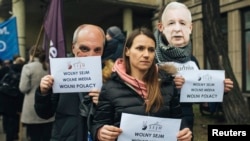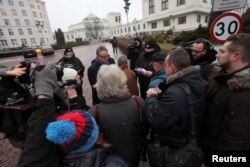Poland's president says he has received a pledge from leaders of the populist ruling party that they won't introduce restrictions on media access in parliament, a plan that had sparked days of bitter protests.
It appeared to be a victory for the political opposition and the civic activists who have staged protests since Friday. It is the second time that the ruling populist Law and Justice party has stepped back from disputed measures due to street protests. In October, the party also withdrew a plan for a total abortion ban after huge numbers of women dressed in black protested across the country.
President Andrzej Duda spoke in an interview on state television Monday evening after holding crisis talks with key ruling party figures, including the powerful chairman, Jaroslaw Kaczynski.
Duda, who hails from the populist ruling party and remains aligned with it, said the party had “good intentions” when it announced last week that it planned to include various restrictions that would have limited the access of journalists. It would have marked a change from the situation of the past years, with reporters able to mingle in the halls of parliament with lawmakers and film the sessions. He said the plan was only intended to help journalists organize their work better.
But he acknowledged it was too divisive and said the matter was no longer on the table.
“We must ensure citizens' access to information about the work in parliament,” Duda said.
Political crisis
Poland has been in a state of political crisis for more than a year over sweeping changes introduced by the Law and Justice party under Kaczynski. Many of the changes have been denounced by the European Union and liberal Poles as violations of the rule of law, particularly steps that have paralyzed the Constitutional Tribunal, weakening the system of checks and balances.
Still, Law and Justice enjoys fairly stable support, with an approval rating of 36 percent in a recent poll. Its most popular policy involves monthly cash bonuses for children. It has also voted to lower the retirement age from 67 to 60 for women and 65 for men — a bill that Duda signed into law earlier Monday.
The crisis deepened Friday when opposition lawmakers occupied the area around the speaker's podium in parliament, blocking work on legislation. Ruling party lawmakers then moved to another room in the parliament building and voted on the budget.
Without a record that there was a quorum, there are questions about the vote's legality and the opposition is demanding a new vote.





